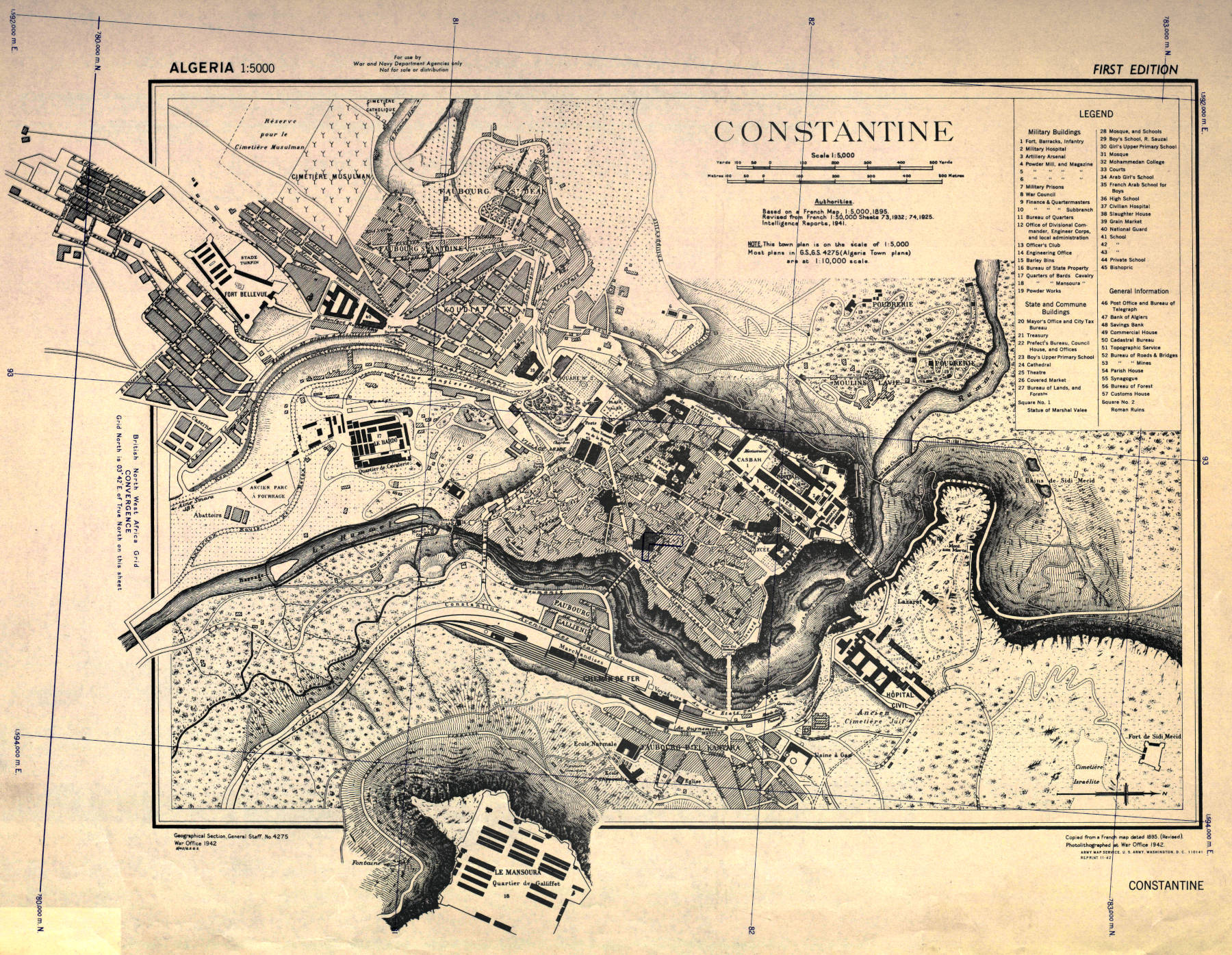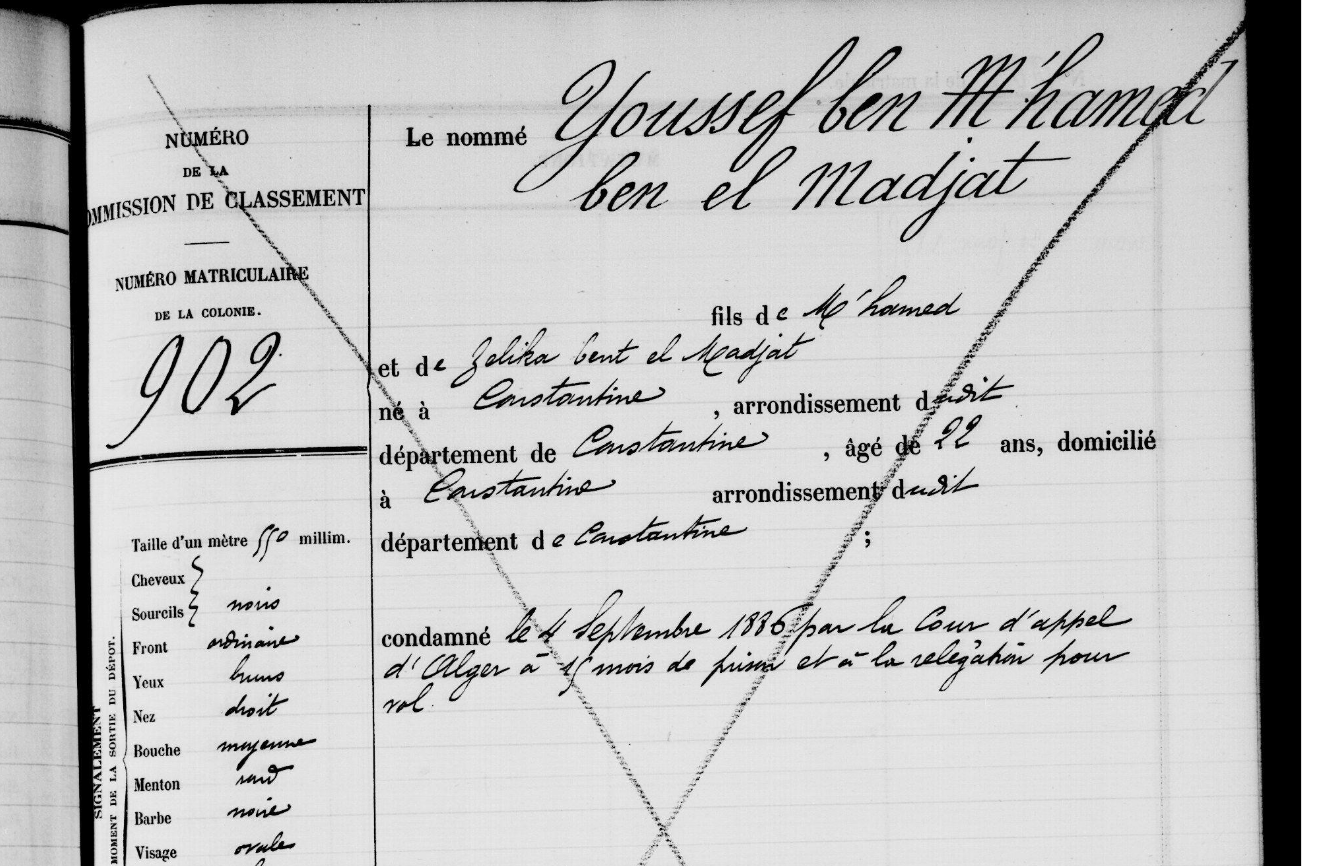The surname Benelmadjat traces back to the Ottoman era in Algeria. It is documented as one of the traditional Turkish-origin family names in the city of Constantine, a major Ottoman stronghold in eastern Algeria. During the Ottoman rule (16th–19th centuries), many Turkish officers and officials settled in Algerian cities like Constantine, often marrying into local families. Their descendants, known as Kouloughlis (children of Turkish fathers and local mothers), formed a distinct community. The Benelmadjat family fits this pattern – family lore about an Ottoman officer ancestor who came from Turkey to Constantine aligns with historical trends, as the Ottoman Turks established quarters and communities in Constantine and other coastal cities. In fact, Benelmadjat is explicitly listed among common surnames of Turkish origin in Constantine, suggesting the family likely descends from an Ottoman-era settler (possibly an officer, as oral history indicates).
The Legacy of the Benelmadjat Family
An interactive journey through the history and genealogy of a family with roots in Ottoman Algeria.
The Benelmadjat Family Name: History and Origins

Map of Ottoman Algeria, 1719
Earliest Records and Family History
One of the earliest public records of the name is from the late 19th century under French colonial rule. A man named Youssef ben Mohamed ben El Madjat (born ~1864 in Constantine) appears in archival records as having been convicted in 1886 and deported to the penal colony in French Guiana. The French documentation gives his lineage as “ben Mohamed ben El Madjat,” implying that “El Madjat” was the name or nickname of an earlier ancestor (likely the Ottoman-era forebear). Youssef died in exile in 1895. This record not only evidences the family’s presence in Constantine in the 1800s, but also suggests that the Benelmadjat surname had become an inherited family name by that time (following the introduction of civil status by French authorities). The ancestor referred to as “El Madjat” would have lived in the early 19th century or before – very possibly the Ottoman officer or official whom family tradition credits as the founder of the line. While specific details of his life are scarce in available sources, the timing and the Ottoman-onward usage of the name support the family story. It’s worth noting that many Algerians of Turkish descent faced tumultuous times during the French conquest and colonial period. Some Ottoman-descended families fled Algeria when the French took control in 1830, and others stayed but were caught up in later resistance or conflicts. The case of Youssef Ben El Madjat might indicate involvement in resistance against colonial rule (since numerous Algerian insurgents and rebels were exiled to Guyana), though the exact reason for his conviction isn’t stated in the record. In any case, the Benelmadjat family endured through the colonial era in Constantine, maintaining their name and identity.
Distribution and Diaspora
The surname Benelmadjat has always been relatively uncommon, concentrated in Algeria and among its diaspora. Today, it is primarily found in Algeria (on the order of only a couple hundred bearers at most), with a small presence abroad. Statistical genealogy data indicate about 150–155 people with this surname in Algeria (as of the 2010s). Within Algeria, the name appears in various regions – historically rooted in Constantine, but also recorded in other areas. For example, one source notes a number of bearers in Mascara and Tiaret provinces of Algeria, suggesting that branches of the family may have spread or relocated over time (possibly due to employment, marriage, or post-independence resettlement). There is also a small French-born branch of the family: a handful of individuals with the Benelmadjat name live in France. These are likely descendants of Algerian emigrants, especially from the mid-20th century when many Algerians moved to France. The user’s observation of families in France with the same surname fits this pattern – indeed, by the 2010s the name was most prevalent in Algeria and virtually only seen outside it in France. This reflects both Algeria’s historical ties to France and the family’s continued existence into the present day. (In modern Algeria, the name occasionally surfaces in public life – for instance, a Samira Ben El-Madjat was noted as a department director in Constantine’s health sector in a 2025 press report, and a secondary school in Constantine bears the name Djaloul Ben El Madjat, presumably honoring a local figure from the family.)
View Benelmadjat DatabaseName Meaning and Variations
Benelmadjat is an Arabic-based surname constructed in the typical Maghrebi style. The prefix “Ben” means “son of” (equivalent to Ibn), indicating a patronymic origin. El Madjat thus likely originated as the epithet or name of an ancestor. One interpretation given by a name-origin resource is that Benelmadjat could mean “son of the teacher” or “son of the one who knows,” implying the original El Madjat was a learned man. In this view, the surname might have been bestowed on descendants of an érudit or professeur, reflecting esteem for his knowledge. However, this etymology is not confirmed by academic sources and should be treated cautiously. It’s equally possible that “El Madjat” was simply the personal nickname or Turkish/Arabic name of the ancestor (for example, it might derive from a Turkish name or a local moniker that was phonetically altered over time). Given the family’s Ottoman roots, the original name could have been Turkish, later arabized by adding “Ben” in front. Without clear historical records of that individual, the exact meaning remains speculative. Like many Maghrebi surnames, Benelmadjat has appeared with multiple spellings over the years. Differences in French transliteration, record-keeping, or family preference have led to several variants of the name. Common forms include:
Common Variations
- Benelmadjate
- Bennelmadjat
- Bennelmadjate
- Benelmaddjat
- Benmadjate
- Benel Madjat
- Benmadjate
- Belmadjat
- ben El Madjat
There are also related surnames that seem phonetically close – for example, Benmedjadi is found in Algeria and may be a closely related variant or branch, with about 154 bearers, primarily in North Algeria. In older French documents, the components might be split (e.g. “Ben el Madjat”) or concatenated in different ways. All these variations refer to the same family name, and researchers must be aware of them when tracing genealogy. Overall, the Benelmadjat family story is one of deep roots in Ottoman Algeria, a survival through colonial challenges, and a legacy carried into modern times by descendants in Algeria and abroad. The name itself stands as a link to an ancestor from centuries past – quite possibly an Ottoman Turk whose lineage became part of Constantine’s rich tapestry of families. While not famous on a national scale, the Benelmadjat family’s heritage is a thread in the larger historical fabric of Algeria, illustrating how personal family lore can indeed reflect genuine history supported by archival records and surname evidence.
Linguistic and Historical Origins of the Name El Madjat
The following is a summary of research conducted to understand the origins of the name "El Madjat".
“El Madjat” is a rare Maghrebi name whose etymology is not immediately obvious. Historical evidence suggests it may derive from an Arabic/Berber toponym or tribal name rather than a common noun or title. Below we explore its possible linguistic roots and historical usage across Arabic, Amazigh (Berber), Ottoman Turkish, and other contexts, as well as similar surnames that shed light on its origin.
Constantine: The Home City
Constantine, also known as the "City of Bridges," is a city in eastern Algeria. It was the capital of the same-named province for centuries. During Roman times it was called Cirta and was renamed "Constantina" in honor of emperor Constantine the Great. It was the capital of the French department of Constantine until 1962. The city has a rich history and has been the home of the Benelmadjat family for generations.
View Colonial PhotographsHistorical Maps

Constantine/Qasentina - Algeria (1884)

Manuscript City Plan - Constantine, Algeria (circa 1837)

Constantine Map - Algeria (WW2 Era)

Manuscript City Plan - Constantine, Algeria (circa 1837)
Gallery

Prise de Constantine (13 Octobre 1837)

General View - Constantine, Algeria (1899)

Elcantara Bridge - Constantine, Algeria (1855-1856)
Historical Persons of the Family

Youssef ben Mohamed ben El Madjat
Born: ~1864 in Constantine, Algeria
Died: 1895 in the penal colony of French Guiana
One of the earliest documented members of the family, Youssef was convicted in 1886 under French colonial rule and deported. His record provides key evidence of the family's presence in Constantine during the 19th century.
References and Sources
- Ottoman Turkish families in Algeria and Constantine - en.wikipedia.org
- Constantine family heritage and surnames (Fatima-Z. Guechi, Constantine: une ville, des héritages, 2004)
- French colonial records of Youssef ben Mohamed ben El Madjat (convict in 1886) - bagneblog.wordpress.com, recherche-anom.culture.gouv.fr
- Liste des Algériens déportés au bagne de Guyane (blog compilation) - bagneblog.wordpress.com
- Genealogical data on surname distribution (Forebears.io)
- Name origin interpretations (NomOrigine.com) and related surname spellings.
- Arabic lexicons via Al-Maany Dictionary for مجاج (majāj, “spittle; honey”) - almaany.com
- Wikipedia (English/Arabic) on Majjate (مجّاط) tribe and commune in Morocco - ar.wikipedia.org
- Wikipedia (French/Arabic) on Sidi Mohammed Ben Ali El-Medjadji, 16th-c. Algerian mufti (born in Medjadja) - fr.wikipedia.org
- Turks in Algeria – common surnames in Constantine (Benelmadjat listed among old Turkish/Maghrebine families) - en.wikipedia.org
- 19th-c. Algerian deportee list mentioning “…ben El Madjat” - bagneblog.wordpress.com
- Forum post on Constantine’s ancient families confirming Benelmadjat presence (18th c. or earlier) - algerie-dz.com
- Forebears.io surname database for El Majjati (frequency in Morocco) - forebears.io